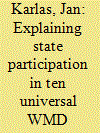| Srl | Item |
| 1 |
ID:
192521


|
|
|
|
|
| Summary/Abstract |
Much of what we know about state participation in universal weapons of mass destruction (WMD) treaties is based on research about the Nuclear Non-Proliferation Treaty (NPT). This article instead analyzes the ratification of all ten current WMD treaties. Using a survival analysis of ratification events (1960–2022), it challenges conventional wisdom. It shows that security threats—a factor stressed by neorealists and research on the NPT—provide only a weak and incomplete explanation. Instead, three types of costs and benefits influence ratification decisions: policy change costs, benefits from the secondary functions of treaties, and benefits from the conformity with the ratification behavior of regional peers. More specifically, the article finds that the possession and pursuit of WMD delays ratification. The country’s support for the liberal hegemonic order, the level of its economic development, and a high regional ratification rate of the respective treaty increase the probability of ratification.
|
|
|
|
|
|
|
|
|
|
|
|
|
|
|
|
| 2 |
ID:
193015


|
|
|
|
|
| Summary/Abstract |
In the last 40 years, the international community has made considerable progress towards the regulation of inhumane conventional weapons (ICWs) by adopting treaties that regulate or ban these weapons. However, many states have still not joined these treaties or have joined them with a considerable delay. These ratification decisions cannot be satisfactorily explained by the existing literature on the origin of ICW treaties, which stress the role of global socialization processes. This article offers a theoretical argument that explains state decisions on the ratification of ICW treaties. It argues that while democracies and countries located in regions with high ratification rates are prone to ratify ICW treaties, an insecure external environment impedes or delays ratification. The argument also claims that security costs resulting from the characteristics of the individual treaties can modify the effects of these explanatory factors. To provide an empirical test for the argument, the article conducts a survival analysis that covers the ratification processes of the three existing ICW treaties.
|
|
|
|
|
|
|
|
|
|
|
|
|
|
|
|